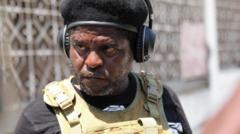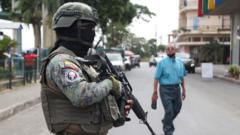As El Salvador faces scrutiny over its controversial anti-gang measures led by President Nayib Bukele, police officers reveal that many arrests lack substantial evidence, driven by enforceable quotas.
El Salvador's Police Under Fire for Arrest Quotas in Anti-Gang Campaign

El Salvador's Police Under Fire for Arrest Quotas in Anti-Gang Campaign
Police admit to unjust arrests aimed at meeting mass incarceration targets during Bukele’s anti-gang initiative.
In a striking revelation, police officers from El Salvador have corroborated allegations that many of the 80,000 arrests made during President Nayib Bukele's aggressive anti-gang campaign were based on mere hearsay and preposterous evidence. Recent reports highlight intense pressure on officers to fulfill arrest quotas established since the declaration of a state of emergency in 2022. These insights come from a fresh Human Rights Watch report and interviews with several police personnel, including a representative from the country’s main police advocacy group.
Under President Bukele, who boasts a remarkable turnaround in El Salvador’s public safety metrics, the crackdown has been labeled as a necessary measure to combat rampant gang violence. However, many families of the detained have continuously voiced their grievances, asserting that their loved ones were ensnared in the police net due to flimsy accusations and rumors.
The officers have disclosed that existing quotas have compelled them to carry out arrests without valid evidence, driven by a pervasive fear that dissent could lead to their own arrest on charges of being complicit with gang activities. While Bukele's narrative positions him as a protector of public safety, the reality illustrates a darker side of law enforcement in El Salvador, questioning the legitimacy of this widespread crackdown on supposed criminal elements.


















